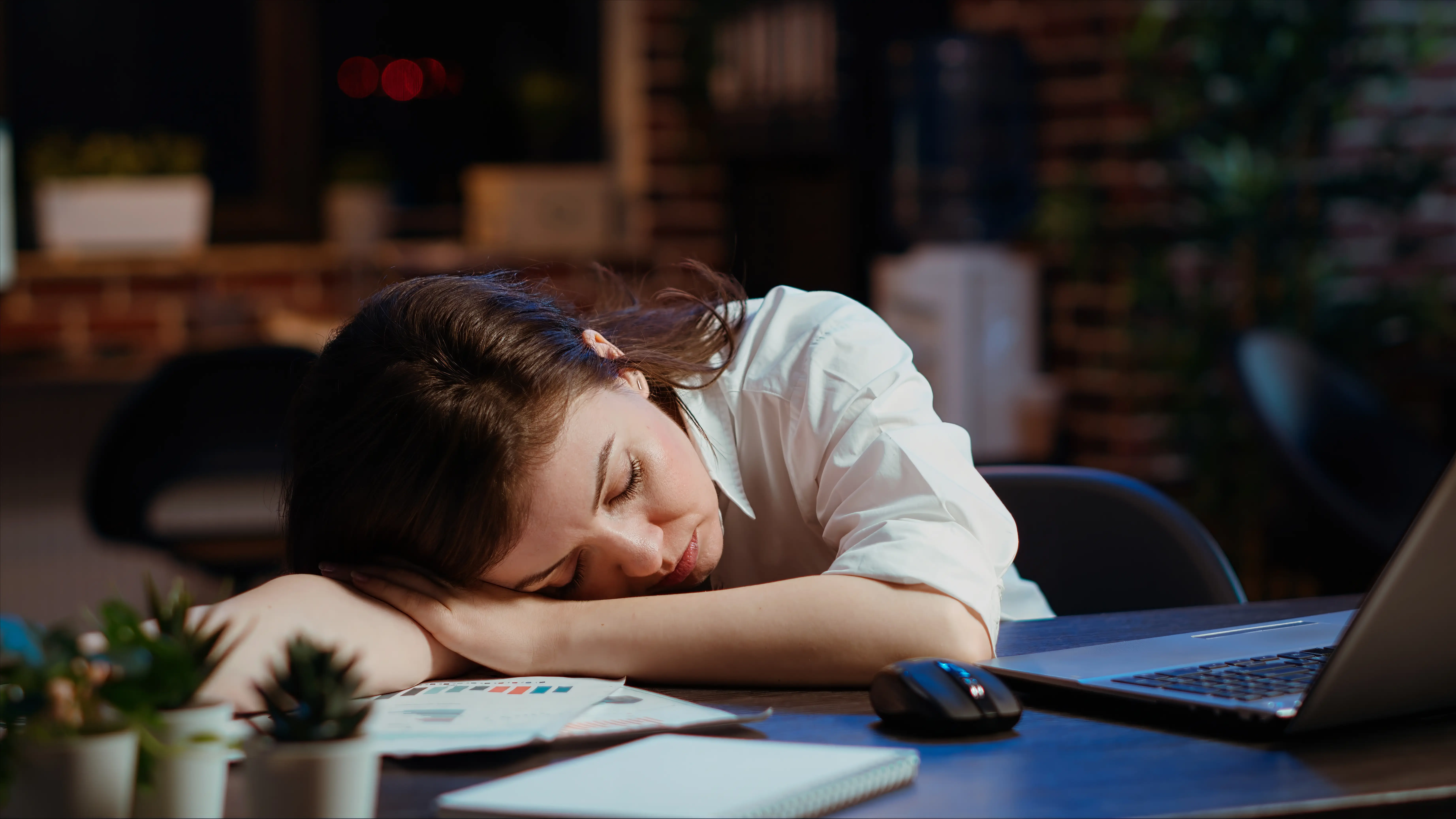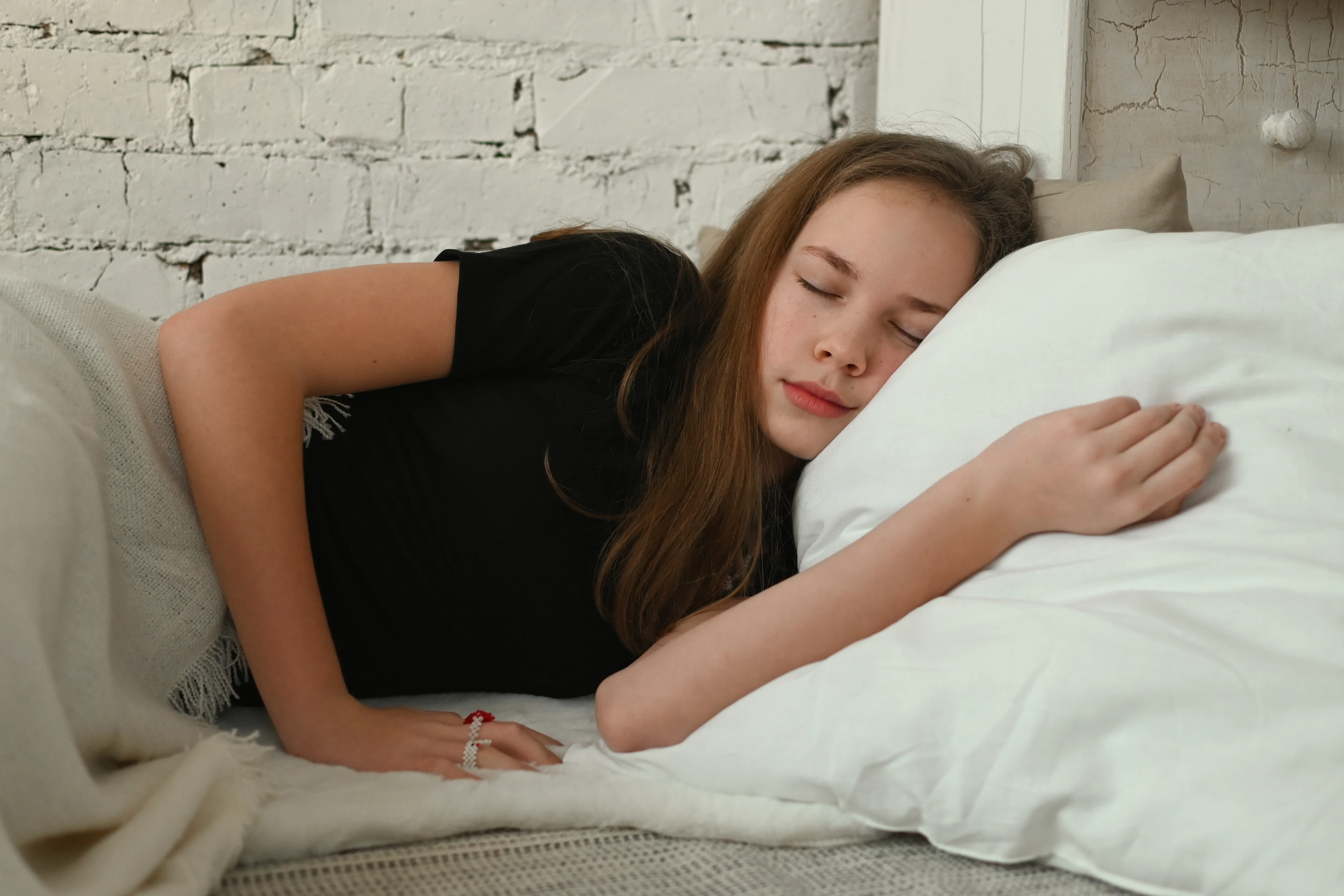Sleep is a critical component of overall health and well-being, particularly for teenagers who are undergoing significant physical and emotional changes.
As teenagers often face various stressors, including academic pressures and social dynamics, prioritizing adequate sleep is essential for their holistic development.
Understanding how much sleep a teenager should get can empower parents and guardians to foster healthier sleep habits in their children.
In this article, we will discuss the recommended sleep duration that a teenager should get, as well as the symptoms and causes of sleep deprivation in teenagers.
How much sleep should a teenager get?

There are many factors that could dictate how many hours of sleep teens need, as teenagers require adequate sleep for optimal physical and mental health, with the recommended sleep duration ranging from 8 to 10 hours per night.
This amount is crucial for their growth, cognitive development, and emotional well-being. Insufficient sleep can lead to various issues, including decreased academic performance, heightened stress levels, and increased susceptibility to mental health disorders.
Establishing healthy sleep habits and a consistent bedtime routine are essential in ensuring that teenagers achieve the recommended sleep duration. By prioritizing proper rest, adolescents can significantly improve their overall quality of life and enhance their daily functioning.
Why Sleep Is Important for Teenagers
For teenagers, sleep benefits cannot be overstated. During adolescence, the body experiences rapid growth and hormonal changes that require adequate rest and a healthy sleep cycle, as well as sleep stages for proper development.
Physical Growth and Development
Sleep is crucial for teenagers as it plays a significant role in their physical growth and development. During adolescence, the body undergoes various changes, and adequate sleep is essential for the release of growth hormones that facilitate these processes.
Sleep disruption can hinder not only physical development but also cognitive function, leading to difficulties in concentration and memory retention.
Brain Development and Cognitive Function
The importance of sleep cannot be stressed enough for teenagers, as it plays a crucial role in cognitive functioning and academic performance. Teenagers often face demanding schedules filled with schoolwork, extracurricular activities, and social obligations.
Insufficient sleep can lead to deficits in attention, problem-solving skills, and critical thinking abilities.
Emotional Regulation and Mental Health
The relationship between sleep and mental well-being is another significant aspect that highlights why sleep is important for teenagers. Adolescence is a period marked by emotional fluctuations and an increased risk of mental health issues such as depression and anxiety.
Inadequate sleep can exacerbate these conditions, creating a vicious cycle where mental health challenges further disrupt sleep patterns.
Memory Consolidation
The brain undergoes processes essential for memory consolidation, enhancing learning and academic performance. Adequate sleep helps teenagers retain information learned during the day, making it easier to recall during exams or class discussions.
Consequences of Sleep Deprivation On Teenagers

Sleep deprivation among teenagers has become an increasingly prevalent issue in today's fast-paced society.
With academic pressures, extracurricular commitments, and the pervasive influence of technology, many adolescents find themselves sacrificing sleep to meet various demands.
Short-Term Effects
- Fatigue: One of the most immediate consequences of insufficient sleep is fatigue. Adolescents require an average of 8 to 10 hours of sleep per night, yet many fail to meet this requirement due to academic pressures, social activities, and screen time. As a result, they often experience overwhelming tiredness during the day, which can hinder their performance in school and other activities.
- Irritability: Teenagers are at a developmental stage where emotional regulation is crucial. Lack of sleep can exacerbate mood swings and heighten emotional responses, making them more prone to anger and frustration. This irritability can strain relationships with peers, family members, and educators, leading to conflicts that might not have arisen under normal circumstances.
- Lack of Focus: The lack of focus is another prominent short-term effect experienced by sleep-deprived teenagers. Proper cognitive functioning relies heavily on adequate rest, and without it, attention spans can wane significantly. Students may find it challenging to concentrate during classes or while studying, leading to poor academic performance.
Long-Term Risks
The long-term consequences of sleep deprivation can be profound and far-reaching, impacting not only the immediate well-being of teenagers but also their future health and academic performance.
- Mental Health Decline: Inadequate sleep can disrupt the brain's regulatory mechanisms, leading to mood imbalances and emotional instability. Teenagers who do not get sufficient sleep are more susceptible to experiencing feelings of sadness, hopelessness, and anxiety. These mental health challenges often result in a vicious cycle, where sleep deprivation exacerbates depressive symptoms, and in turn, depression further impairs sleep quality. This interplay can lead to a decline in emotional resilience during a developmental period when mental health is crucial for self-esteem and social interactions.
- Weakened Immune System: Adolescence is a period marked by significant physical changes and growth, making a robust immune system essential for overall health. Sleep plays a critical role in supporting immune function; however, chronic lack of sleep can weaken the body's defense mechanisms. This increased vulnerability may lead to a higher incidence of infections and illnesses, further complicating an adolescent's ability to engage in school and social activities effectively.
- Poor Academic Performance: Sleep is essential for cognitive processes such as memory consolidation, problem-solving, and critical thinking skills that are vital for success in an academic setting. When teenagers do not receive adequate rest, their ability to concentrate diminishes, leading to decreased motivation and lower grades. This decline in academic performance can have long-term implications, affecting college admissions and future career opportunities.
Common Causes of Sleep Loss in Teens
Sleep loss in teens is a prevalent issue that can significantly impact their overall health and academic performance, and there are many causes that could contribute to sleep deprivation in teens.
Addressing these factors is crucial to ensure that teens receive the restorative sleep they need for optimal functioning.
Academic Pressure and Homework
The increasing demands of homework and extracurricular activities can lead to late-night study sessions, significantly impacting sleep quality and duration.
As students strive to perform well academically, they may prioritize their assignments over essential rest, resulting in chronic sleep deprivation.
Social Life and Extracurricular Activities
The pressure to balance academic responsibilities alongside social commitments can create stress, further disrupting sleep patterns.
As adolescents strive to maintain an active social life while participating in numerous extracurricular activities, they may neglect the importance of adequate sleep, ultimately impacting their overall health and well-being.
Screen Time and Digital Distractions
Many adolescents engage with smartphones, tablets, and computers late into the night, which not only delays their sleep onset but also disrupts their circadian rhythms.
The blue light emitted from these devices interferes with melatonin production, making it harder for them to fall asleep.
Early School Start Times
Adolescents have unique sleep needs, requiring approximately 8 to 10 hours of rest for optimal functioning. However, many schools begin classes early in the morning, disrupting their natural sleep cycles.
This misalignment can lead to chronic sleep deprivation, affecting academic performance and overall well-being.
Hormonal Shifts Affecting Sleep Cycles
Sleep loss in teens is a prevalent issue, significantly influenced by various factors. One of the primary causes is hormonal shifts affecting sleep cycles, which are particularly pronounced during adolescence.
These hormonal changes, especially sleep hormones, can disrupt the sleep routine of teenagers, leading to difficulties in both falling asleep and staying asleep.
Signs Teens aren’t Getting Enough Sleep

Sleep is an essential component of a teenager's physical and mental well-being. However, many adolescents fail to get the recommended amount of rest, which is about 8 to 10 hours per night.
Understanding the signs that indicate teens aren’t getting enough sleep is crucial for parents, educators, and caregivers to intervene effectively and promote healthier sleep habits.
Persistent Fatigue During the Day
One of the most prominent signs that a teenager may not be getting adequate sleep is persistent fatigue during the day. This can manifest as difficulty staying awake in school, a tendency to doze off during classes, or a lack of energy for after-school activities.
When teens are chronically tired, they may struggle to concentrate or retain information, leading to declining academic performance
Change in Their Sleep Patterns
If a teenager frequently stays up late and struggles to wake up in the morning, it may signal a misalignment with their natural circadian rhythms.
This disruption can lead to insomnia or other sleep disorders, exacerbating feelings of exhaustion and stress.
Excessive Reliance on Caffeine or Energy Drinks
Excessive reliance on caffeine or energy drinks to stay awake can indicate an unhealthy approach to managing fatigue.
Parents should be vigilant about these behaviors as they can contribute to a cycle of poor sleep hygiene.
Social Withdrawal
Social withdrawal can be another sign that teens are not getting sufficient sleep. If a usually outgoing teenager suddenly becomes reclusive or loses interest in social activities, it could stem from overwhelming fatigue or a lack of motivation caused by insufficient rest.
Sleep deprivation can lead to feelings of loneliness and sadness, potentially exacerbating underlying mental health issues such as anxiety or depression.
Mood Swings or Irritability
Mood swings and irritability are common indicators of sleep deprivation. Teens may find themselves more easily frustrated or upset over minor issues, which can strain relationships with peers and family members.
Tips to Help Teenagers Get Enough Sleep
Many teenagers struggle to achieve the optimal sleep recommendation of 8-10 hours of sleep each night due to various factors such as academic pressures, social activities, and the pervasive use of electronic devices.
To help teenagers get enough sleep, a multifaceted approach is essential, incorporating lifestyle adjustments, sleep hygiene practices, and education on the significance of quality rest and sleep regulation.
Set a Consistent Bedtime and Wake Time
Going to bed and waking up at the same time every day helps regulate the body's internal clock, also known as circadian rhythm, making it easier to fall asleep and wake up feeling refreshed. Encouraging teenagers to create a consistent sleep schedule and wake time can also signal to their bodies that it’s time to wind down.
Limit Screen Time Before Bed
It is crucial for teenagers to limit their exposure to screens before bedtime. The blue light emitted by smartphones, tablets, and computers can interfere with melatonin production, making it harder for them to fall asleep.
Setting a "screen curfew" an hour before bedtime can significantly enhance sleep quality. Instead of engaging with electronic devices, encouraging activities such as journaling or meditating can promote relaxation and prepare their minds for rest.
Create a Comfortable Sleep Environment
Creating a comfortable sleep environment plays a significant role in helping teenagers get enough sleep. The bedroom should be dark, quiet, and cool to facilitate restful slumber.
Investing in comfortable bedding and ensuring that the room is free from distractions can greatly improve sleep quality.
Teens also should be mindful of their caffeine intake, particularly in the afternoon and evening hours. High-caffeine beverages can disrupt sleep patterns and make it challenging for teens to fall asleep at night.
Educate About the Importance of Sleep Hygiene
Education about the consequences of sleep deprivation is essential for fostering a culture of sleep hygiene habits among teenagers.
Awareness of how insufficient sleep impacts academic performance, mood regulation, and physical health can motivate them to prioritize rest.
Schools and parents should work together to promote healthy sleeping habits as part of a broader initiative aimed at improving student wellness.
Encouraging Physical Activity During the Day
Encouraging physical activity during the day is another effective strategy for improving sleep among teenagers. Regular exercise has been shown to promote deeper sleep and reduce symptoms of anxiety and depression, both of which can interfere with restful nights.
Activities such as sports or even a brisk walk after school can help regulate their sleep-wake cycle and contribute positively to their overall health.
Know more about Best Time to Exercise for Better Sleep.
When to Seek Help
If a teenager starts exhibiting some signs, it’s crucial for Parents and guardians to proactively seek help from professionals. Timely intervention can lead to better outcomes and significantly improve a teenager's quality of life, ensuring they are well-rested and ready to face the challenges of their formative years.
Understanding when to seek help can make a difference in addressing these issues early on.
When Teenagers Start Showing Symptoms of Sleep Disorders
Teenage sleep deprivation is a growing concern, as insufficient sleep can significantly impact a young person's physical and mental health.
It is crucial for parents, educators, and healthcare professionals to recognize the signs that may indicate a teenager is suffering from sleep disorders such as insomnia, sleep apnea, or restless leg syndrome.
- Insomnia: Characterized by difficulty falling or staying asleep, insomnia is one of the most common sleep disorders among teenagers. Symptoms may include prolonged periods of wakefulness at night, frequent awakenings, and excessive daytime sleepiness. If a teenager exhibits these symptoms consistently for several weeks, it is advisable to consult a healthcare professional.
- Sleep Apnea: Sleep apnea can lead to poor sleep quality and excessive daytime fatigue. Common indicators of sleep apnea in teenagers include loud snoring, gasping for air during sleep, and persistent fatigue despite an adequate amount of sleep hours. If parents notice these signs, seeking medical advice is essential. A healthcare provider may recommend a sleep study to diagnose the condition accurately and suggest appropriate interventions to improve the teenager's sleep health.
- Restless Leg Syndrome: Characterized by an uncontrollable urge to move the legs, RLS often worsens in the evening or at night, leading to difficulty falling asleep. If a teenager frequently complains of uncomfortable sensations in their legs or struggles to remain still at night, it is crucial to seek assistance from a medical professional. Addressing RLS not only enhances sleep quality but also contributes positively to overall well-being.
When Persistent Problems Arise
When persistent problems arise, such as difficulty falling asleep, frequent awakenings, or excessive daytime sleepiness, it may indicate a deeper issue requiring professional intervention.
Parents and guardians should monitor their teenagers’ sleep patterns and overall health. If these sleep disturbances continue despite implementing good sleep hygiene practices, consulting a healthcare provider can provide valuable insights and potential solutions.
FAQs
Is 6 hours of sleep enough for a teenager?
While some may argue that 6 hours of sleep can be sufficient for a teenager, most adolescents require between 8 and 10 hours per night for optimal functioning.
Can too much sleep be bad for teenagers?
Teenagers who consistently sleep more than the recommended 8-10 hours may experience increased fatigue, mood disturbances, and a decline in academic performance. Furthermore, too much sleep can disrupt the body's natural circadian rhythms.
Can naps help teenagers catch up on sleep?
Yes, Short naps, ideally lasting 20 to 30 minutes, can enhance cognitive function, mood, and overall well-being. They provide an opportunity for teenagers to replenish their energy levels and improve concentration during the day.
What’s the best bedtime for a teen?
Given the demanding nature of school, extracurricular activities, and social engagements, a bedtime between 10 PM and midnight is often ideal.
Should naps be allowed during the day?
Naps should be allowed during the day for teens due to their unique developmental needs. Adolescents often experience disrupted sleep patterns and increased fatigue, which can negatively impact their academic performance and cognitive functioning.
Does exercise help teenagers sleep better?
Exercise can reduce stress and anxiety levels, which are common among adolescents and often interfere with sleep. As a result, incorporating a consistent exercise routine can help teenagers fall asleep faster and enjoy deeper, more restorative sleep. Know more about The Connection Between Exercise and Insomnia
Conclusion
It is clear that teenagers require a significant amount of sleep to support their physical, emotional, and cognitive development.
The general recommendation for adolescents is between 8 and 10 hours of sleep per night. Insufficient sleep can lead to various issues, including poor academic performance, mood swings, and increased susceptibility to health problems.
Parents and educators must prioritize sleep education and encourage healthy sleep habits among teenagers. By recognizing the importance of adequate rest, we can help foster an environment that promotes overall well-being and optimal functioning in this critical stage of life.
Jessica H.
Jessica is a reviewer, writer, and sleep enthusiast at Sleepiverse. Jessica graduated with her master's degree in Nursing research and education. She is a registered nurse and currently works in the Intensive Care Unit. Since becoming a nurse, Jessica has worked the night shift, which means a disrupted sleep schedule. Knowing she needed to function at her best while caring for patients at night, she spent a lot of time researching how to sleep well with a difficult schedule.


